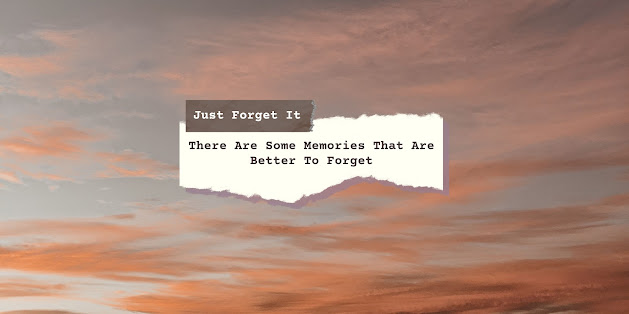Featured
There Are Some Memories That Are Better To Forget
The Power of Memory
Memories are the threads that weave the fabric of our lives. They help us learn from the past, make decisions in the present, and envision our future. A true story that perfectly captures the idea that "some memories are better to forget" serves as an example of the power of memory in both positive and bad contexts.
A Real-Life Example: Sarah's Struggle
Meet Sarah, a 30-year-old woman with a promising career in the field of marketing. Although everything about her life seemed ideal, there were memories beneath the surface that she wished she could forget. Sarah suffered a devastating childhood accident when she saw a serious vehicle accident involving a close family member who was killed. This event left an indelible mark on her psyche.
Over the years, Sarah tried to suppress this traumatic memory. She buried it deep in her brain because she thought that was the only way to handle the emotional havoc it brought about. She reasoned that if she could just forget, she would be free from the pain it brought.
The Burden of Unforgotten Memories
But as Sarah became older, the burden of that repressed memory started to catch up with her. Her career began to suffer as she became more and more difficult to develop meaningful relationships with. She had no idea how the unprocessed memory was affecting her day-to-day activities; it was causing anxiety, melancholy, and a lack of confidence in other people.
Sarah's story is not unique. Many people have unpleasant memories that they would prefer to forget, whether they are the result of marital breakdowns, childhood traumas, or other upsetting incidents. However, Sarah's case serves as a poignant example of the toll these unprocessed memories can take on one's mental and emotional well-being.
The Healing Power of Remembering
Eventually, Sarah sought professional help to confront her past and the traumatic memory that had haunted her for so long. She discovered in therapy that facing a difficult experience head-on was more beneficial than trying to forget it. It was a difficult process that made her relive the hurt and feelings connected to the collision.
In the course of therapy, Sarah realized that the act of remembering, processing, and integrating her painful memory was the key to healing. She learned to acknowledge her emotions and cope with them in a healthier way. She was able to take back control of her life, mend her relationships, and resume her successful career through this approach.
The Wisdom of Forgetting
While Sarah's story illustrates the importance of remembering and processing certain memories, there are instances where forgetting is indeed a wiser choice. In these situations, it is preferable to let the past go because the memories have no useful purpose and may even be harmful to one's well being.
Toxic Relationships: Memories of toxic or abusive relationships can have lasting negative effects. Retaining these recollections can exacerbate low self-esteem and worth issues. To promote emotional healing and personal development in such situations, it is frequently preferable to let go and move on.
Past Mistakes: We all make mistakes, but dwelling on past errors can lead to guilt and regret that hinders personal progress. Instead of constantly revisiting these memories, it may be better to acknowledge them, learn from them, and move forward.
Embarrassing Moments: Everyone can recall unpleasant incidents they'd want to forget. Even while they may make you shudder, these situations frequently teach no important lessons and may be safely put in the past.
Conclusion
In the tapestry of our lives, memories play a pivotal role. They affect our emotions, direct our decisions, and mold our perspectives. Certain memories are priceless, leaving traces of happiness, love, and success in our hearts. Others, however, are better left forgotten. It's critical to keep in mind that, despite sometimes necessity, forgetting is not a cure-all for unpleasant memories. In cases like Sarah's, healing and personal growth are achieved by facing the past and embracing the difficult memories, not by burying them.
Each individual's journey with memory is unique, and the decision of what to remember and what to forget is a deeply personal one. For the purpose of healing and personal development, certain memories are better left in the past, but others are worthwhile recalling and facing. Ultimately, it is our ability to strike a balance between remembering and forgetting that allows us to navigate the complex tapestry of our lives with wisdom and resilience.
Popular Posts
Failures - The Best Source of Inspiration
- Get link
- X
- Other Apps
Unleashing Creativity and Fulfillment in Life by Discovering Your Passion
- Get link
- X
- Other Apps



Comments
Post a Comment